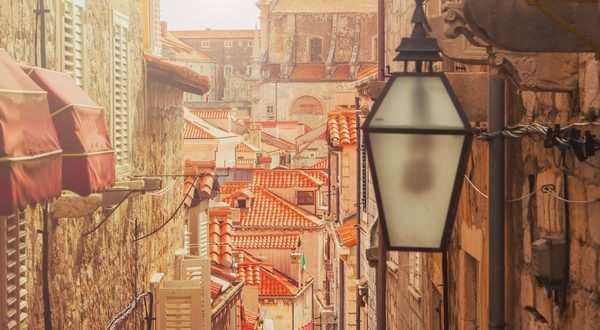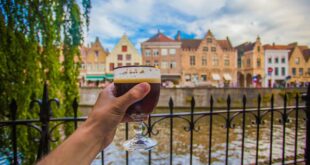[ad_1]
Nothing can prepare you for your first sight of Dubrovnik.
We only had a day to spend here, our first port stop on a 7-night Celebrity Mediterranean cruise. Though we’d seen photos and read up on the ancient walled city, we never expected to be so intrigued and enamored. It’s no wonder Dubrovnik is emerging as one of Europe’s top destinations.
Located on the southern end of Croatia’s magnificent Dalmatian Coast, the appeal of this Pearl of the Adriatic is unique and awe-inspiring.
Dubrovnik’s prosperity came as a result of its shipbuilding and seafaring trade during the illustrious Golden Age of the 14th and 15th centuries. During this era, this remarkable city dripping with Renaissance grandeur rivaled Venice as a maritime power.
Visiting Old Town Dubrovnik
Strongly built to withstand pirates and invaders, Old Town with its high walls and bastions was once considered to be among the greatest fortification systems of the Middle Ages. Dubrovnik is widely renowned as one of the world’s finest and most perfectly preserved medieval cities in the world. So much so that it’s been named a UNESCO World Heritage site for its profound historical significance.
Winding narrow roads surrounded by towering walls lead to Dubrovnik’s enchanting Old City. The Gate of Pile on the western edge of the town has been its main portal for centuries.
A stone bridge leads to a massive wooden drawbridge, suspended by heavy chains. In earlier times, the drawbridge was pulled up each night to protect the city.
Streets and squares of the town are made of smooth marble and the enchanting area with its Renaissance and Venetian influence is ringed with monasteries, churches, galleries, museums, shops, cafes, fountains, palaces, and terraced houses. There is no grass to be found in this walled city—only stone.
History oozes from every corner of the Stradun, the main pedestrian avenue and heartbeat of the city. Shops line both sides of this wide thoroughfare and in this vibrant setting, locals and visitors of all ages celebrate life.
The historic city was placed under siege by Serbian forces for eight months in 1991-1992 during Croatia’s war of independence. Two-thirds of the city was damaged and the walls suffered direct hits. But the mighty fortifications protected the city from total destruction exactly as they were meant to. Though the city’s undergone extensive renovation since then, some scarring of bullet holes on buildings serve as a reminder of those difficult times.
Medieval churches are usually built as dominating landmarks, but it’s the City Bell Tower, originally constructed in 1444 soaring high above the stratum of Dubrovnik that steals the show. Every 15 minutes, its melodious chimes can be heard for miles throughout the city.
“Walking the wall” is without a doubt the number one draw in Old Town and was the absolute highlight of our visit. It takes approximately two hours to complete the challenging one-mile circuit. As the walls and bastions encompass the sloping hillsides of the city, we found ourselves constantly climbing and descending narrow winding stairs.
From high above, we were treated to spectacular views of the town’s patchwork of red-tiled roofs, the shimmering Adriatic Sea, stunning coastline, and nearby islands.
The highest point of the wall is the Minceta Fortress. Resembling a large chess piece, the fortification was originally built in the 14th century and is one of the town’s iconic landmarks. This last climb was quite challenging but the views are magnificent and well worth the effort.
Old Town was the major filming location in Croatia for the popular HBO series Game of Thrones (GoT). Bokar Fortress perched high at the western end of the city and surrounded by massive seaside walls serves as the site of King’s Landing, the capital of the Seven Kingdoms. And the walls of Old Town are prominent features in many GoT scenes.
Dubrovnik Cathedral
The Romanesque Dubrovnik Cathedral of the Assumption of the Virgin Mary was built in the 17th century. It replaced an older cathedral destroyed in the massive 1667 earthquake. The original church was reportedly funded by England’s King Richard the Lionhearted in gratitude for being saved from a shipwreck on the nearby island of Lokrum.
The impressive cathedral is known for its fine altars including the violet marbled altar of St. John of Nepomuk. The church’s treasury contains 182 gold and silver relics, some set with jewels, and numerous religious paintings. The most famous is 16th-century Venetian painter Titian’s paneled polyptych of the Assumption of the Virgin mounted directly behind the main altar.
When the primary streets of Old Town become crowded as they often do, an escape into the magnificent lantern-lined narrow alleyways is a perfect reprieve. Here, quaint boutique shops and charming eateries beckon and beguile enchanted Dubrovnik visitors.
Old Port Dubrovnik
Though cruise ships dock in the new modern port of Dubrovnik, it’s the Old Port that has all the charm. A myriad of colorful old and new fishing boats moor along the ancient walls. It seemed somewhat comforting to think that standing here on the breakwater; we had the same view of the medieval town as seamen visiting Dubrovnik in centuries past.
Kayaking the Adriatic
Adventure Dubrovnik, owned and operated by a team locally born and provides among its other adventures, sea kayaking tours right outside the walls of Old Town.
Dubrovnik’s fortifications are best seen from the sea. Guides accompany kayakers on a two-hour trip over the calm Adriatic waters, under an awe-inspiring limestone archway, and into fascinating hidden caves.
Riding the Cable Car
On clear sunny days, seeing Dubrovnik from the air is highly recommended. So hopping on a cable car, we soared 1,353-feet over the rocky cliffs of Mt. Srd.
Once on top, we marveled at the incredible vistas of the medieval town, the vast waters of the cerulean sea, and the many islands dotting the horizon. Locals say that on a day like ours, one can see as far as 37 miles.
Tastes of Dubrovnik
The people of Dubrovnik are a friendly lot and Old Town has some wonderful taverns and eateries. Currency is the Kuna though some businesses take the Euro and most take major credit cards.
Seafood is the most common delicacy here due to its location right on the sea. Octopus, squid, calamari and grilled fish can be found on practically every menu, though a variety of cuisines are offered.
Everyone raves about the Buza Bar whose name comes from its entrance—a small hole (buza) in the side of the wall leading to a beach bar perched high over the sea cliffs. Prices are somewhat higher here for libations than in other Old Town establishments. But the views are to die for and it’s absolutely worth it.
Weary from a long adventurous day, our group met for a late dinner back on the cruise ship. Our champagne toast was quite spontaneously agreed upon. “To the Wall” was our hearty salutation to one magnificent day in Dubrovnik.
[ad_2]You can read more of the news on source
 Travelsmart
Travelsmart



